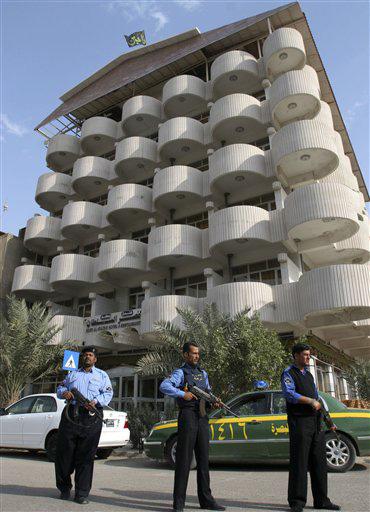Muqtada al-Sadr’s office condemns journalists’ kidnapping in Iraq

Iraqi policemen stand guard in front of the Sultan Palace Hotel in central Basra, Iraq, Tuesday, Feb. 12, 2008. The U.S. television network CBS reported Monday that two of its journalists had gone missing in the predominantly Shiite southern city of Basra Nabil al-Jurani, The Associated Press
February 12, 2008
BAGHDAD – Radical Shiite cleric Muqtada al-Sadr’s office on Tuesday condemned the kidnapping of two CBS journalists in the southern city of Basra, while Iraqi police said an intensive search was under way for the men.
Separately, a 27-year-old Iraqi journalist who disappeared after leaving his offices two days ago to buy some supplies was found shot to death Tuesday in central Baghdad.
Iraqi police and witnesses said the kidnapping in Basra took place Sunday morning when about eight masked gunmen wielding machine guns stormed the Sultan Palace Hotel and seized a British reporter and his Iraqi interpreter.
CBS News said Monday that two journalists working for it were missing in Basra, but it did not identify them.
Basra, Iraq’s second-largest city, has seen fierce fighting between rival Shiite militias as part of a power struggle in the oil-rich south.
Get The Daily Illini in your inbox!
The Sadrists were quick to distance themselves from the disappearance of the journalists.
“We condemn the kidnappings of journalists, and we demand the release of the British journalist and the Iraqi interpreter,” Harith al-Edhari, a director of al-Sadr’s office in Basra, told reporters. “Our office condemns such events and we call on security forces to help in their release.”
An official in the Basra security operations room, who spoke on condition of anonymity because of security concerns, said authorities had launched an intensive search and had arrested a man suspected of involvement in the kidnapping in an overnight raid.
CBS said all efforts were under way to find the journalists and requested “that others do not speculate on the identities of those involved” until more information was available.
Kidnappings of Westerners and Iraqis – for political motives or ransom – were common in the past but have become infrequent recently with a decline in violence.
Since 2004, three journalists – James Brandon and Steven Vincent and Fakher Haider of The New York Times – have been abducted in Basra, according to the Committee to Protect Journalists. Brandon was released, but Vincent and Haider were murdered, it said.
According to CPJ, at least 51 journalists have been abducted in Iraq since 2004. The New York-based group said the majority was released, but 12 were killed.
“Iraq is the most dangerous country in the world for journalists and the deadliest conflict for the press in recent history,” CPJ Executive Director Joel Simon said. “Journalists face incalculable risks in order to bring us the news about what is happening on the ground there.”
CPJ also has recorded at least 126 journalists killed since the U.S.-led war started in March 2003, excluding the latest death.
Hisham Michwit Hamdan, 27, went missing Sunday after he left the offices of the Young Journalists League to get notebooks and pens at a market in the central Baghdad district of Bab al-Mudham district, the league’s chief said.
His bullet-riddled body was found Tuesday in central Baghdad, according to league chief, Haider al-Moussawi and police. Hamdan joined the independent organization when it was established in 2003 as a media watchdog and had not reported any threats, al-Moussawi added. He is survived by a wife and two children.
If one of those missing in Basra is confirmed to be British, he would be the first Western journalist known to have been abducted in Iraq since Jill Carroll, who was seized in Baghdad on Jan. 7, 2006, and released three months later.
The British military turned over responsibility for Basra to Iraq in December but maintains forces near the city, a predominantly Shiite one, 340 miles southeast of Baghdad.
The military deferred questions to Britain’s Foreign Office, which said only that it was looking into the matter “with some urgency.”
“We’re aware that Western citizens have been reported missing in Iraq, and it’s a matter we’re looking into with some urgency,” a British Foreign Office spokeswoman said, speaking on condition of anonymity in line with government policy.
Meanwhile, a police officer was killed and two others wounded Tuesday morning when gunmen in a speeding car attacked their patrol just south of Basra, police said.
Northeast of Baghdad, gunmen opened fire on a school bus in the volatile Diyala province, killing two girls and a boy and wounding the driver and two other pupils, police said. The attack happened as the bus traveled between the predominantly Sunni town of Kanaan and the mainly Shiite town of Balad Ruz.
Iraqi police and forensics officials also said a mass grave with 13 decomposed bodies was uncovered in an orchard near the Diyala province city of Muqdadiyah, about 60 miles north of the capital. The U.S. military denied the report.
The Iraqi officials, speaking on condition of anonymity because they weren’t authorized to release the information, said the bodies were discovered by U.S. troops during operations and turned into the morgue in nearby Baqouba.
Capt. Stephen Bomar, a U.S. spokesman in northern Iraq, said in an e-mail that “no conventional coalition forces” were involved in such a discovery and “the claim currently appears to be false.”
Associated Press writers Hamid Ahmed and Sinan Salaheddin contributed to this report.






